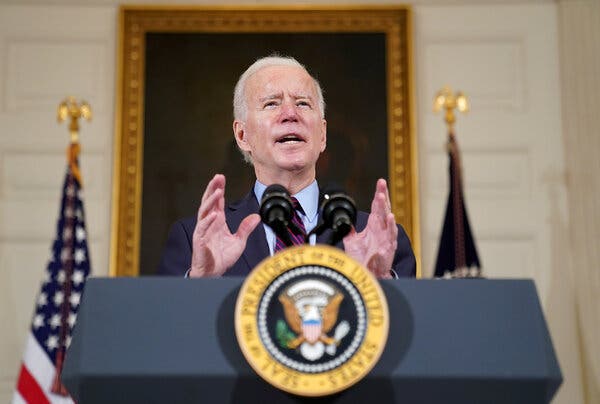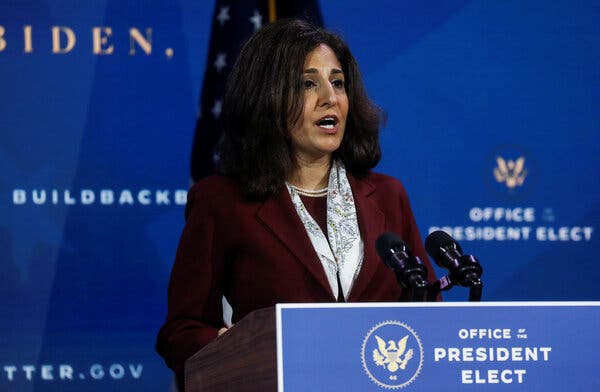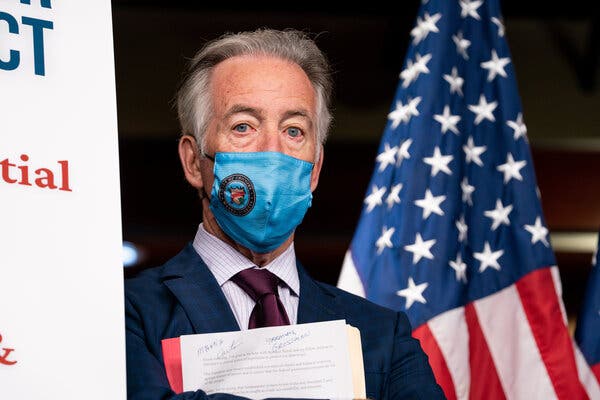If Rupert Murdoch’s Fox News is at all worried about recent ratings declines, the company hid its concern well. Mr. Murdoch’s powerhouse television business continues to see growth in revenue and profit, reporting gains on both items in its quarterly earnings report announced Tuesday.
Fox Corporation, led by Mr. Murdoch’s son Lachlan Murdoch, the chief executive, saw a 17 percent jump in pretax profit, to $305 million. It logged an 8 percent gain in sales, to $4 billion, for the three months ending in December, what the company considers its second fiscal quarter.
The company’s Fox broadcast stations helped drive much of that growth as local networks saw record political advertising during the presidential election season. The broadcast division saw a 10 percent bump in ad dollars, to $1.8 billion.
Despite losing the ratings crown to CNN in recent weeks, Fox News is still a profit machine. The Fox News division saw a 1 percent gain in revenue, to $1.49 billion, and a 3 percent increase in pretax profit, to $571 million. Advertising increased 31 percent, to $441 million, but the fees paid by cable operators to carry the network fell 3 percent, to $928 million, as more people cut the cord.
Lachlan Murdoch trumpeted the cable news network’s performance through last year, downplaying the recent downturn in viewership.
“The Fox News Channel finished the quarter with highest average ratings,” he said on an earnings call with analysts. “We are now seeing expected audience pullback since the election,” a phenomenon he described as “consistent with prior election cycles.” He expects audiences to eventually return to the network.
The company also announced a multiyear renewal contract for Suzanne Scott, the head of the network, dispelling any concerns that she may be replaced given its recent ratings performance.
But hanging over the company’s financial future is a defamation lawsuit recently brought against Fox Corporation by a little-known technology provider. The suit, filed by Smartmatic, whose system was used in the presidential election in Los Angeles County, is seeking at least $2.7 billion in damages against Fox Corporation, Fox News and several of its prime-time stars for participating in “the conspiracy to defame and disparage Smartmatic and its election technology and software,” according to the suit.
The financial penalty sought by Smartmatic appears to closely mirror the amount of profit Fox Corporation generates. For calendar year 2020, the company made about $3.1 billion in pretax earnings. Fox recently filed a motion to dismiss the suit.

The chief executive of Fox News, Suzanne Scott, will remain in her role for several years to come after signing a new contract with Rupert Murdoch’s Fox Corporation, the network said on Tuesday.
The new multiyear deal will keep Ms. Scott as the leader of Fox News Media, which also includes the cable channel Fox Business and the streaming service Fox Nation.
“Suzanne’s track record of success, innovative sprit and dedication to excellence make her the ideal person to continue to lead and grow Fox News,” Lachlan Murdoch, the executive chairman of the Fox Corporation and Rupert Murdoch’s eldest son, said in a statement on Tuesday.
The network did not disclose the exact length or financial terms of the deal.
Fox News is facing a major defamation lawsuit and working to regain the ratings crown it recently lost to CNN for the first time in decades. Some viewers left the network for alternative channels like Newsmax after Fox’s news division called the presidential election for Joseph R. Biden Jr., over the protestations of then-President Trump.
Until Election Day, though, Fox News had been enjoying another record year under Ms. Scott’s tenure. Its weeknight lineup ended the year as the third-most-watched in all of prime-time television, ahead of the ABC broadcast network.
“I am grateful to Rupert and Lachlan Murdoch for the opportunity to continue leading Fox News Media and positioning all of our platforms for future success,” Ms. Scott said in a statement.

The five former NY1 anchors who left the popular local news channel after settling an age and gender discrimination lawsuit late last year now say the station is breaking its promise to the women by not submitting any of their recent work for Emmy consideration.
The new claim was filed late Monday night with the New York City Commission on Human Rights. The five former anchors — Amanda Farinacci, Jeanine Ramirez, Kristen Shaughnessy, Roma Torre and Vivian Lee — have a combined three Emmys and 10 additional Emmy nominations (not to mention nine New York Press Club awards).
The anchors filed the age and gender discrimination lawsuit in June 2019 and left the station in December 2020; the terms of the settlement were not disclosed. They now say that NY1’s decision not to submit their 2020 work for Emmy nominations, which are due Feb. 15, is retaliation for the discrimination lawsuit.
In the complaint, the former anchors say the station had previously agreed to submit more than a dozen of their stories, including eight of Ms. Torre’s theater reviews (a category for which she won an Emmy in 2019); Ms. Shaughnessy’s and Ms. Lee’s anchoring on Nov. 7, the day Joseph R. Biden Jr. was declared the winner of the presidential election; Ms. Farinacci’s story about a New York police detective discovering her biological family after the Sept. 11 terror attacks; and Ms. Ramirez’s portrait of a Brooklyn family affected by gun violence.
Maureen Huff, a spokeswoman for Charter Communications, the cable giant that acquired NY1 in 2016, said, “While the women no longer work at NY1, we do not prohibit former employees from submitting their work for Emmy consideration.” She did not comment on why the station was not submitting their work.
David E. Gottlieb, a lawyer for the anchors, said in an email that the anchors “don’t have the footage at this point” and have not asked the station for it.
General Motors said it would extend by a few weeks the closure of three North American plants because of the semiconductor shortage that is disrupting auto production around the world.
The company halted production on Monday at plants in Fairfax, Kan.; Ingersoll, Ontario; and San Luis Potosi, Mexico, and now plans to keep them idle until the middle of March, G.M. said in a statement. The automaker had originally planned for a weeklong halt.
G.M. also said two plants in Wentzville, Mo., and Ramos Arizpe, Mexico, would produce vehicles without the electronic components that use chips that are in short supply, and install the parts later.
A spokesman said the company is using the limited supply of chips for more popular cars and trucks.
The chip shortage is the result of the disruptions caused by the coronavirus pandemic. When auto plants had to close last spring because of the virus, chip-makers shifted production to consumer-electronics products such as game consoles and have struggled to restore production of auto chips fast enough to keep up with demand for new cars.
Almost every automaker has had to slow production because of shortages of critical electronics such as engine and transmission controllers.
Last week, Ford Motor said that the shortage would likely lower its pretax profit this year by $1 billion to $2.5 billion.
G.M. is expected to elaborate on the impact the shortage is having on its operations when it reports 2020 earnings on Wednesday.

President Biden will meet with top business leaders at the White House on Tuesday as part of his push to rally support for the $1.9 trillion pandemic package being debated in Congress and his plan raise the minimum wage.
Mr. Biden, Vice President Kamala Harris and Treasury Secretary Janet Yellen will meet on Tuesday afternoon with the chief executives of Walmart, Gap, Lowe’s and JPMorgan Chase, as well as Tom Donohue, who heads the U.S. Chamber of Commerce.
The meeting is expected to focus on a range of topics related to the president’s economic plan. Mr. Biden and his top advisers are expected to discuss the administration’s proposal to raise the minimum wage to $15 an hour from $7.25, people familiar with the event have said.
The idea of an across-the-board increase to $15 an hour faces opposition from the U.S. Chamber of Commerce and at least one of the chief executives invited to the event has also urged a slower, more targeted increase. Doug McMillon of WalMart has said that he believes $7.25 is too low, but any plan should take into account “geographic differences.”
Such a move would not happen right away, if at all. Mr. Biden and Democratic leaders have already committed to not raise the wage until the pandemic has subsided. It also faces significant headway from Republicans, who say it will force small businesses to fire workers and could put some out of business.
But Mr. Biden and his allies in Congress see as a central weapon for fighting poverty and inequality.
A report by the Congressional Budget Office on Monday found evidence that both sides cited in support of their arguments: a $15 minimum wage would offer raises to 27 million people and lift 900,000 people above the poverty line, but it would also cost 1.4 million jobs, the budget office concluded.
Here are the chief executives invited to the event on Tuesday:
-
Jamie Dimon of JPMorgan Chase
-
Tom Donohue of the U.S. Chamber of Commerce
-
Doug McMillon of Walmart
-
Sonia Syngal of Gap Inc.
-
Marvin R. Ellison of Lowe’s Companies

Neera Tanden, President Biden’s nominee to head the Office of Management and Budget, told a Senate committee this morning that she regretted past statements and Twitter posts critical of Republicans, as G.O.P. senators repeatedly expressed concerns about her online posts.
“I deeply regret and apologize for my language, some of my past language,” Ms. Tanden said. “I recognize that this role is a bipartisan role, and I recognize I have to earn the trust of senators across the board.”
Ms. Tanden is the president of the liberal Center for American Progress think tank, a veteran of the Clinton and Obama administrations and a former top aide to Hillary Clinton’s 2016 presidential campaign. She testified on Tuesday morning before the Senate Homeland Security committee, with a second hearing scheduled for Wednesday before the budget committee.
Several Republicans on the committee criticized Ms. Tanden for past statements, including Twitter posts, in which she criticized Republicans in Congress and elsewhere. The committee’s top-ranking Republican, Senator Rob Portman of Ohio, read several of those posts in his opening round of questions, including Ms. Tanden calling Senator Mitch McConnell of Kentucky, the minority leader, “Moscow Mitch,” and her Twitter post saying “vampires have more heart than Ted Cruz,” a Republican senator from Texas.
Mr. Portman and other Republicans on the committee pressed Ms. Tanden on whether she would be able to work across the aisle given those posts. They also asked why she deleted more than 1,000 Twitter posts shortly after the November election. An hour into the hearing, Republicans had asked Ms. Tanden nearly as many questions about her Twitter behavior as they did about policy issues.
“I’ve deleted tweets because I regretted my tone,” Ms. Tanden said. “I’m sorry, and I’m sorry for any hurt they’ve caused.”
In her opening statement, Ms. Tanden also stressed her qualifications for the job, including her experience being raised by an immigrant single mother who was forced to draw on the government safety net at times.
“We relied on food stamps to eat, and Section 8 vouchers to pay the rent,” Ms. Tanden said. “At school, I remember being the only kid in the cafeteria line who used 10-cent vouchers from the Free Lunch Program. I remember using food stamps at the grocery store.”
“If I am privileged to serve as director,” she said, “I would ensure that O.M.B. uses every tool at its disposal to efficiently and effectively deliver for working Americans, small businesses and struggling communities.”
Democrats have criticized Republicans for their expressed concern over Ms. Tanden’s Twitter practices, after many senators frequently refused to address Twitter controversies involving former President Donald J. Trump. One Republican on the committee, Senator James Lankford of Oklahoma, seemed to nod to those comparisons in his questioning of Ms. Tanden on Tuesday.
“You actually have tweeted more in the last four years than President Trump did,” Mr. Lankford said, “in terms of numbers.”

Bitcoin continued its rally, the latest leg of which was set off by Tesla’s announcement on Monday that it had purchased $1.5 billion worth of the digital currency and would start accepting Bitcoin payments. Bitcoin rose above $48,000 per coin early on Tuesday, a record, before coming off that high later, according to CoinDesk, a trading platform for digital currencies.
It is up more than 45 percent in 2021, and other cryptocurrencies are rising, too — including Dogecoin, which rose about 1,000 percent over the past week.
The momentum has been building as more trading apps allow users to buy, hold and sell cryptocurrencies, reported Nathaniel Popper for The New York Times: “The rally is a moment of euphoria for the thousands of different versions of digital money, which years ago were dismissed as little more than online Beanie Babies caught in a speculative bubble,” he wrote.
Stock markets
-
On Wall Street, the S&P 500 was slightly lower in early trading Tuesday, after the index had climbed to another record on Monday. Through Monday, the S&P 500 had climbed for six consecutive trading days.
-
European market were modestly changed, with the FTSE in Britain up slightly while the Stoxx Europe 600 was slightly lower.
-
The Nikkei in Japan gained 0.4 percent, while the Kospi in South Korea fell 0.2 percent.
Stimulus checks
-
Democrats in the House on Monday proposed legislation to send stimulus checks of $1,400 to Americans earning up to $75,000 and households with incomes up to $150,000. The direct payments are a critical part of President Biden’s stimulus plan, although the proposal may run into opposition from Republicans and some Democrats who want to focus the payments on lower-income Americans.
-
House committees on Tuesday are expected to begin considering the overall $1.9 trillion package, aimed at supporting the economy through the pandemic.
Benefits of lockdown
-
Ocado, the online supermarket based in Britain, reported a 35 percent rise in sales over the past year. As the company invests in new warehouses, “The landscape for food retailing is changing, for good,” said the chief executive, Tim Steiner.
-
Still, the company reported a net loss of 44 million pounds (about $60 million), down from 215 million pounds the previous year, and its shares fell.

Cryptocurrency prices are soaring after Tesla said that it had purchased $1.5 billion worth of Bitcoin with company funds. The electric carmaker wasn’t the first company to shift corporate cash into cryptocurrencies, but it was one of the biggest. It could make finance chiefs elsewhere consider whether they should follow suit, the DealBook newsletter reports.
Tesla’s move is an “exclamation point” for institutional acceptance of Bitcoin, said Matthew Graham, the chief executive of the Beijing-based blockchain investment firm Sino Global Capital. “It’s clear that Bitcoin is ready for Main Street.”
Elon Musk, Tesla’s chief executive, is known for bucking convention, so his company’s purchase is not as surprising as it would be at, say, Ford or General Motors.
Tesla had more than $19 billion in cash at the end of 2020, a big enough cushion to make the Bitcoin purchase a relatively small share of its resources. But much of that cash was raised in recent stock sales, and the company only recently reported its second year of positive free cash flow. Because of Bitcoin’s unique characteristics, Tesla will have to record declines in the value of its Bitcoin against its earnings, but cannot book gains.
The software company MicroStrategy now holds Bitcoin worth about a third of its market capitalization, according to a site that tracks corporate holdings. MicroStrategy’s chief, Michael Saylor, held a conference last week that promoted Bitcoin for corporations.
Naresh Aggarwal of the Association of Corporate Treasurers in London is skeptical that many companies will follow Tesla and MicroStrategy and buy Bitcoin at scale. “Gold is probably a more traditional form of alternative investment,” he said, yet few firms outside the financial sector hold it. “If they’re not tempted by gold, then I can’t see them being tempted by Bitcoin,” he added, likening it to “putting money on a horse race.”
Keeping money in liquid, safe investments is particularly important during the pandemic, and many corporate finance chiefs remember being burned in 2008 by higher-yielding alternatives.

After a terrible year for oil companies because of the pandemic, Total of France reported what analysts said were relatively good financial results.
For the fourth quarter of 2020, Total reported that adjusted net income, a metric followed by investors, declined by 59 percent compared with the period a year earlier, to $1.3 billion. Profit for 2020 declined by 66 percent to $4.1 billion.
Analysts applauded the company for beating its own earnings forecasts, and for not cutting its dividend.
“In a quarter of volatile results and disappointing cash flow for the supermajors, Total delivers a good set of numbers,” Giacomo Romeo, an analyst at Jefferies, an investment bank, said in a note to clients.
When including write-offs on the value of oil fields, Total’s net loss amounted to $7.2 billion for the year.
The company also said it was changing its name to TotalEnergies, a signal that it is increasingly investing in clean energy businesses like wind and solar energy.
“The writing is on the wall,” said Patrick Pouyanné, the company’s chief executive. Low carbon energy is the future, he said.
He also said that at present oil remained “at the core” of Total’s business and that the cash produced by oil can be used to finance its investments in cleaner technologies.
The company is based in Paris but global in scope with strong positions in Europe but also in Africa, the Middle East and Russia.
Unlike its European rivals Royal Dutch Shell and BP, which cut their dividends during the year, Total is holding its dividend steady. Mr. Pouyanné said that this policy strengthened the company’s relationship with investors, who expect the company to maintain its payouts through ups and downs.

House Democrats on Monday rolled out a key plank of President Biden’s stimulus plan, proposing legislation to send direct payments of $1,400 to Americans earning up to $75,000 and households with incomes up to $150,000.
The plan, drafted the day before key committees are scheduled to being meeting to consider it, is at odds with proposals from some Republicans and moderate Democrats who want to curtail eligibility for direct payments, targeting it to lower income people. Mr. Biden has said he is open to such modifications.
For now, the measure would allow individuals earning up to $100,000 and households earning up to $200,000 to be eligible for some payment, though the size of the checks would phase out gradually for those with incomes above $75,000, or $150,000 for a family.
The bill, unveiled by Representative Richard E. Neal, Democrat of Massachusetts and the chairman of the Ways and Means Committee, was one of a series that Democrats presented on Monday ahead of a week of legislative work to solidify the details of Mr. Biden’s stimulus proposal.
The decision to keep the income cap at the same level as the last round of stimulus payments comes after days of debate among the House Democratic caucus over the size of the checks, as some moderates pushed to restrict the full amount to those who make $50,000 or less and households earning up to $100,000.
The legislation also includes a series of significant changes to the tax code and an increase in an extension of weekly federal unemployment benefits. It would raise the $300-a-week payment to $400 a week and continue the program — currently slated to begin lapsing in March — through the end of August.
The $1.9 trillion plan would also provide for billions of dollars for schools and colleges, small businesses and a provision that would increase the federal minimum wage to $15 by 2025, a progressive priority.

The race to distribute vaccines and the emergence of more contagious variants of the coronavirus have put a renewed spotlight on the plight of grocery workers in the United States.
The industry has boomed in the past year as Americans have stayed home and avoided restaurants. But in most cases, that has not translated into extra pay for its workers, Sapna Maheshwari and Michael Corkery report for The New York Times. After Long Beach, Calif., mandated hazard pay for grocery workers, the grocery giant Kroger responded last week by saying it would close two locations.
And now, even as experts warn people to minimize time spent in grocery stores because of new coronavirus variants, The Times found only 13 states that had started specifically vaccinating those workers.
“Kroger is sending a message, more than anything else,” said Andrea Zinder, president of Local 324 of the United Food and Commercial Workers, which represents about 160 employees at the two stores. “They are trying to intimidate workers and communities: If you pass these types of ordinances, there will be consequences.”
Kroger, which operates about 2,750 stores, has attracted particular attention because it pursued stock buybacks last year and because its chief executive, Rodney McMullen, earned more than $20 million in 2019. The median compensation of a Kroger employee that year was $26,790, or a ratio of 789 to 1, according to company filings.






